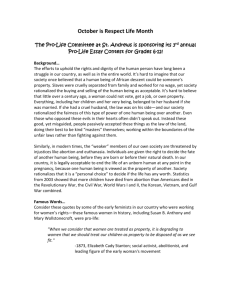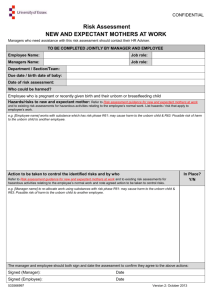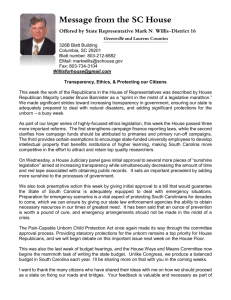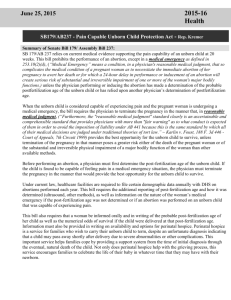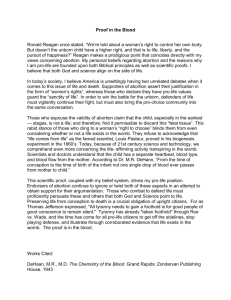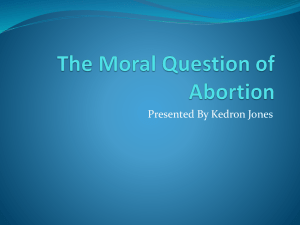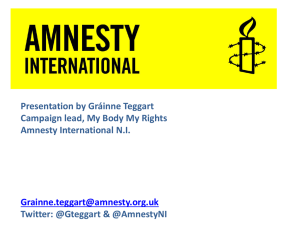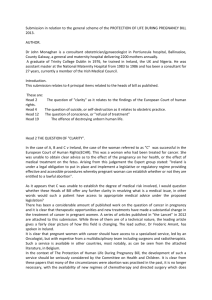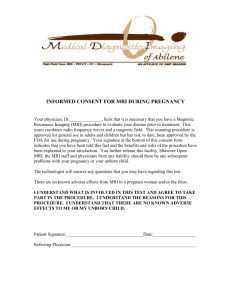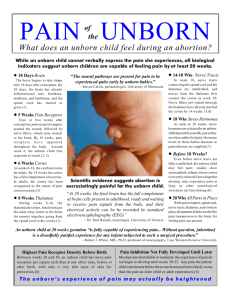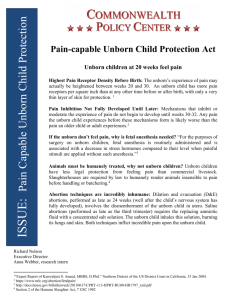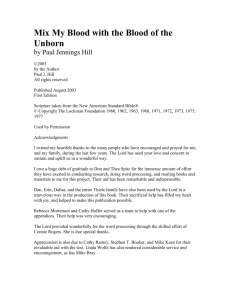Submission Nov2011 Pro Life Campaign
advertisement
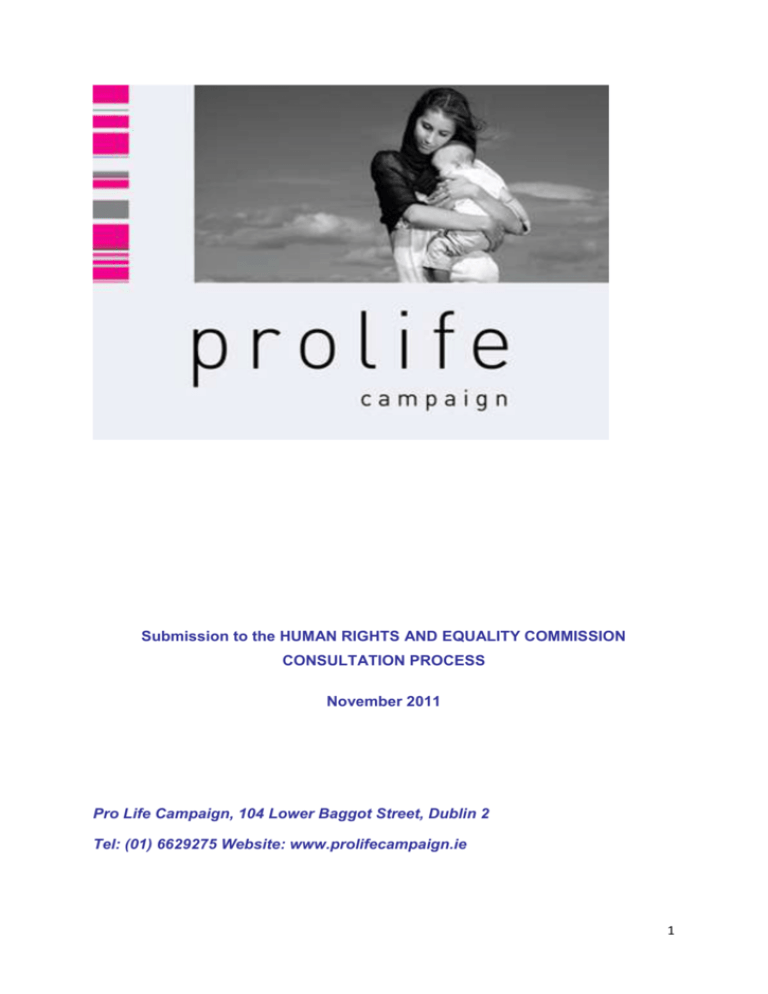
Submission to the HUMAN RIGHTS AND EQUALITY COMMISSION CONSULTATION PROCESS November 2011 Pro Life Campaign, 104 Lower Baggot Street, Dublin 2 Tel: (01) 6629275 Website: www.prolifecampaign.ie 1 The Pro Life Campaigns welcomes the opportunity to make a number of recommendations with regard to the functions and priorities of the new Human Rights and Equality Commission. The Pro Life Campaign suggests that in setting out the functions and priorities of the Commission, particular focus should be placed on vindicating the right to life of every human being, born and unborn since the right to life is the most basic and fundamental human right and without it, all other rights are meaningless. Any authentic vision of human rights must be based on the view that all human beings possess an equal and inherent worth simply by virtue of their humanity, and not on condition of their possessing certain other qualifications of size, physical, emotional or mental capacity, autonomy or dependence, level of bodily, emotional or mental development, race, ethnic origin, wealth or poverty, age, sex or capacity for interpersonal relationship. Genuine human equality can only be vindicated when every human being is welcomed in life and protected in law. The Pro Life Campaign believes that the following matters in particular should be prioritised by the Human Rights and Equality Commission; (i) The reversal of the ‘X Case’ Decision Ireland’s constitutional protection for unborn children was democratically passed by the People in a referendum in 1983. In 1992, the Supreme Court weakened legal protection for the unborn child without hearing any medical evidence that induced abortion was necessary to save the mother’s life. Based on the medical evidence alone, it would be irresponsible to introduce legislation on the grounds of X as it would put the mother’s as well as the baby’s life at risk. The medical evidence over the past 18 years contradicts the medical assumptions of the X case decision.1 2 It is critically important to note that the judges in the X case heard no medical evidence. In the years since the ruling, the evidence has steadily mounted, confirming the reverse of what the judges had assumed - women who have abortions are more likely to commit suicide than women who continue with their pregnancies.3 In order to best protect mothers and their unborn children, the X Case decision must be reversed through a properly worded constitutional referendum. 1 David M. Fergusson, L. John Horwood and Joseph M. Boden, "Abortion and mental health disorders: evidence from a 30-year longitudinal study," The British Journal of Psychiatry (2008), 2008, pp. 444-451 2 Position Statement on Women’s Mental Health in Relation to Induced Abortion, Royal College of Psychiatrists, UK (2008) 3 The European Journal of Public Health 2005 15 (5): 459-463, Injury deaths, suicides and homicides associated with pregnancy, in Finland by Mika Gissler, Cynthia Berg, Marie Helene Bouvier-Colle and Pierre Buekens. 2 (ii) Highlight Ireland’s maternal safety record It is sometimes suggested that because of Ireland’s pro-life ethos pregnant women are denied necessary medical treatments. This is not true. On the contrary, Ireland is a world leader in safety for pregnant mothers. The latest UN report on the safety of mothers during pregnancy found, of all 172 countries for which statistics are given, Ireland leads the world when it comes to safety for pregnant women.4 Pregnant women are safer in Ireland than in countries like Britain and Holland, which permit abortion on demand. Given our record in maternal care, the question has to be asked, why are some people proposing to blur the time-honoured distinction between necessary medical treatments in pregnancy and the deliberate targeting of the baby in the womb with the aim of ending its life? We urge the Commission to recognise Ireland’s outstanding record of care in protecting the lives of women during pregnancy while at the same time affording proper legal protection to the lives of unborn babies. We encourage the Commission to prioritise the maintenance and safeguarding of this remarkable ethos of care for expectant mothers and their unborn children (iii) Supporting Women in Crisis Pregnancy The needs of women facing unexpected pregnancy present a major challenge to society. The attitude society adopts is a crucial factor in determining the decision women will make. The Pro Life Campaign believes that women in crisis pregnancy need and deserve a broad range of social supports. The Equality and Human Rights Commission can play an important part in this regard. Ireland should benefit from the experience of other countries and examine best practice in these countries and adapting what is best suited to our own environment. If we wish to foster a caring and life-affirming culture, respect for the inherent dignity and value of each human life must form the basis of public policy concerning unexpected pregnancy. The Pro Life Campaign urges the Commission to include life-affirming measures to ensure the human rights and needs of women in crisis pregnancy are protected. (iv) Stem Cell Research Recently, the Geron Corporation in America discontinued their destructive research on human embryos. To date, no significant scientific or medical breakthroughs in the treatment of disease have been made via research on human embryos. 4 Report on Maternal Mortality by World Health Organisation, UNICEF, UNFPA and the World Bank, (2007, 2010) 3 In fact, adult stem cell research, involving no destruction of human embryos, is yielding all the breakthroughs we read about on an almost daily basis and proves it is possible to work towards a win-win solution for both ethics and science in the area of stem cell research. Adult stem cell research does not involve the destruction of human life and can be carried out with the consent of the patient. Every person acquires his/her uniqueness and genetic make up from conception. We urge the commission in its work to take steps to prioritise the protection of human embryos from destructive research and other procedures that would endanger their lives at their earliest stages. (v) Majority opinion supports protection of the unborn child The Pro Life Campaign regularly commissions opinion polls on right-to-life issues. Consistent polling over many years shows that a significant majority of the Irish public support legal protection for the unborn child, while at the same time ensuring that women receive all necessary medical interventions in pregnancy. 5 We urge the new Commission to take account of the opinion of the Irish public on this issue and to permit it to inform its work in this regard. (vi) Disability and the Right to Life In Britain abortion is legal up to birth where the baby has special needs. 6 Such a law goes completely against our normal approach to disability rights. If society decides to end the lives of disabled unborn children, it undermines all disabled people’s right to equal respect. A truly life-affirming society works toward giving all necessary supports to families of disabled children or children with life shortening illnesses. One such example is the opening this year of LauraLynn house, a hospice set up to care for children with lifelimiting conditions and their families. Sometimes abortion is proposed as the ‘solution’ to the most difficult situations. But the sign of a genuinely inclusive society, a society that values the human rights and human dignity of every person is one that unconditionally welcomes all human life, born and unborn. We urge the Equality and Human Rights Commission to strive for equality of treatment of those with special needs, born and unborn. 5 Latest Opinion Poll published on 17th November and carried out by Millward Browne Lansdowne found that 6 1 % f a v o u r e d constitutional protection for the unborn child, with 17% opposed. 22% did n't know or had no opinion. When this 22%t is excluded, 78% of people favour legal protection for the unborn, while 22% are opposed. 6 Human Fertilisationand Embryology Act ( 1990). 4 Summary We cannot claim to be a true defender of human rights unless we also protect the right to life of unborn babies. What’s at stake in this debate is the value of life, and the sad experience is that once laws permitting abortion are introduced, they diminish the society’s respect for the inherent value of every human life, born or unborn. Every country has to honestly address issues related to the most fundamental of human rights, the right to life. There is an unceasing challenge for Government and society at large to create a more welcoming and inclusive environment for expectant mothers and their unborn children. By all means, let us debate these issues openly, honestly and with all the facts in front of us. But equally, we cannot shy away from the implications of what legal abortion would involve and the brutal reality of abortion, legal up to birth, in countries like Britain and elsewhere. _________________________ About The Pro Life Campaign The Pro Life Campaign (PLC) is a non-denominational human rights organisation, drawing its support from a cross-section of Irish society. The Campaign promotes pro-life education and defends human life at all stages, from conception to natural death. It also campaigns for resources to support and assist pregnant women and those in need of healing after abortion. The Pro Life Campaign was granted special NGO consultative status by the UN’s Economic and Social Council in 2011. _________________________________________ 5
